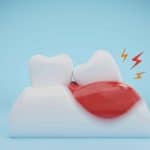Do you clench and grind your teeth? Not sure? If you think you could possibly be suffering from clenching and grinding your teeth (also known as TMJ & bruxism), take 15 mins and listen to Expat Dental’s Dr. Matt discuss the causes of bruxism on MONEY FM 89.3 and why you should have it looked at by a dentist in Singapore.
Why does bruxism occur?
There are a variety of reasons why bruxism can happen. It is often times associated with too much stress and certain personality types. However, it has also been associated with anxiety, genetics, caffeine and alcohol consumption, as well as fatigue and sleeping issues. Often times, our dentists find it is a combination of these factors that starts a clenching and grinding habit.
Symptoms and side effects of bruxism
The true cost of clenching and grinding is not only the impact it can have on your teeth and their future function, but referral pain that can impact your day-to-day life. Bruxism can lead to:
- Teeth that are worn down, cracked, chipped or loose
- Tooth enamel that is worn down
- Tooth pain or sensitivity
- Jaw pain or tight jaw muscles
- Locked jaw that won’t open or close completely
- Neck or face pain or soreness
- Pain that feels like an earache, but the ear itself is fine
- Headache in the morning or migraines that respond poorly to other treatment
- Sleep disruption
- Inflamed nerves behind the eyes that causes blurred vision and light sensitivity
- Tinnitus (ringing or other noises in one or both of your ears)
Diagnoses
Sometimes it’s hard to tell if you have a few instances of bruxism or if it’s turning into a habit forming problem. At Expat Dental, our dentists in Singapore have seen a significant increase in bruxism over the last few years; the COVID-19 pandemic has undoubtedly caused a lot of deviation from the “normal” routine, which in turn has cause uncertainty in many of our lives.
The best way to diagnose the problem is seeing your dentist regularly and discussing any issues/symptoms you might have as soon as you notice them. It’s always better to address a small problem before it turns into a larger subconscious habit.
Treatments for bruxism in Singapore
Thankfully there are several different options for treating clenching and grinding. A good dentist will evaluate the specific patient and devise a treatment plan that will suit the patient’s lifestyle and budget. Here are some of the treatments we use to address bruxism in our dental clinics:
- Custom-made mouthguards/splints. These can go across the whole arch on the top or bottom of the teeth OR a mouthguard/splint that is designed to only cover the front of the teeth. These are called a NTI-tss device.
- Cosmetic injectables. Injectables for your common lines and wrinkles can be highly effective for TMJ! These are used to weaken and paralyze the masseter muscle, which is responsible for your clenching and grinding.
- Be aware! One of the first steps is to identify that you clench and grind and to monitor yourself during the day – bruxism doesn’t only happen at night!
- Meditation
- Acupuncture
- Physiotherapy







